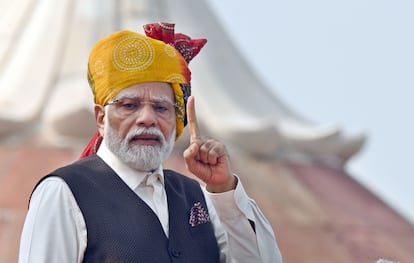Modi, the controversial nationalist leader of a booming India
The Indian prime minister touts economic and geopolitical successes, over which looms a dark shadow of democratic decline and sectarian confrontation

There was a time, between 2005 and 2014, when the current prime minister of India and back then leader of the Indian state of Gujarat, Narendra Modi, was not allowed entry into the United States. Washington barred him under a U.S. rule that prohibits the granting of visas to foreign government officials who promote or are responsible for serious restrictions on religious freedom. The ban on Modi, a Hindu nationalist politician, was invoked in connection with the heavy sectarian violence between Hindus and Muslims that ravaged Gujarat in 2002, when the host of the G20 summit in New Delhi was the head of that western Indian state.
Since then, much has changed — the international climate and Modi’s political status, more than his convictions — and that ban is now a distant memory. India is a more powerful country, and the U.S. now needs it in its struggle with China. Last June, Modi was welcomed for the umpteenth time with the greatest honors in Washington, joining the very select club of leaders who have been able to address the assembled U.S. chambers twice, an honor conferred on figures with the caliber of Churchill and Mandela.
These two episodes represent a significant approach towards a highly controversial leader. The 72-year-old Modi, prime minister since 2014 as head of the Hindu nationalist party (BJP), presides over an Indian nation that has recorded economic and geopolitical achievements while enduring — as denounced by his critics, supported by a multitude of evidence — a democratic deterioration.
Modi is a charismatic politician with tremendous ambition: “I call on the private sector to also come forward. We have to dominate the world,” he said in his speech on the 75th anniversary of India’s independence.
Modi presides over a country that has recorded unparalleled growth among major economies over the past two years, achieved a major breakthrough in its lunar program in August, gained increasing influence on the international scene and, according to the World Bank’s governance indices, has made significant strides in its performance in a number of areas, such as management, regulatory and anti-corruption efficiency. At the G20 summit, the leader chalked up a diplomatic success by reaching a consensus that seemed difficult to achieve.
India is undergoing a process of modernization with major structural investments, while reducing poverty levels. The road ahead is vast, as is the delay with respect to its great rival, China, and nothing guarantees that it will be smooth, but there are data that reveal improvements in recent years.
Nevertheless, Modi is the subject of extremely serious accusations — from the opposition and from the vast majority of experts and think tanks in the democratic sphere — of being a leader who advocates an exclusionary and dangerous Hindu nationalist vision, and who directs a political project that deteriorates the quality of Indian democracy in multiple ways. The criticism is based on a wide range of controversial issues.
Leading indicators from independent Western think tanks believe the deterioration to be dramatic. Reporters Without Borders (RSF) ranks India 161st out of 180 regarding freedom of the press, a marked decline from the past. Annual studies by Freedom House, The Economist Intelligence Unit and V-Dem all agree that there has been a gradual deterioration. The Indian government believes that these reports are purely judgmental and have no objective value.
Troubling facts
There are a wide variety of troubling facts. Early in his first term, Modi drove through a law to reform the system for selecting Supreme Court judges, entering an area notoriously sensitive to democratic balances.
Years later, he passed a law granting accelerated citizenship status to undocumented migrants of all major religions in the region, all with the exception of Muslims. At the time, the government claimed that it was a measure to protect minorities at risk in neighboring countries. Critics argued that this was a first major breach of the secular and inclusive spirit of the Indian Constitution.
This was followed by the adoption of measures that hampered the work of NGOs and the media through inspections and bureaucratic constraints, including those imposed on broadcasters such as the BBC, which had been trying to shed light on the events in Gujarat.
The Modi government has resorted to draconian communications shutdowns in the Muslim-majority state of Jammu and Kashmir, which has been deprived of the special status it had enjoyed for decades. The recent sentencing of opposition leader Rahul Gandhi to two years in prison for the alleged slander against Modi was particularly disturbing — Gandhi was once stripped of his parliamentary seat. However, the Supreme Court has suspended the sentence.
The streets of New Delhi during the days of the recent G20 summit were lined with posters depicting the effigy of the leader together with various political messages associated with the meeting. This scenario — though unusual in democracies, common in other types of regimes — reflects the extraordinary prominence of Modi, whose popularity is much higher than that of his party.
His supporters see him as the initiator of great strides forward for India, of more effective and less corrupt governance. His detractors allege that this popularity is maintained by manipulating the political, judicial and media playing field and dangerously nurturing Hindu identity sentiment through the marginalization of other communities, especially the Muslim one, with more than 200 million citizens. At the New Delhi summit, he presided over the negotiations behind a sign that said Bharat instead of India, the name of the country preferred by Hindu nationalists. This fueled speculation that he will soon launch the offensive to change the name of the country to this name, while the English version of the Constitution now stands as India. This is another likely element of controversy.
Sign up for our weekly newsletter to get more English-language news coverage from EL PAÍS USA Edition
Tu suscripción se está usando en otro dispositivo
¿Quieres añadir otro usuario a tu suscripción?
Si continúas leyendo en este dispositivo, no se podrá leer en el otro.
FlechaTu suscripción se está usando en otro dispositivo y solo puedes acceder a EL PAÍS desde un dispositivo a la vez.
Si quieres compartir tu cuenta, cambia tu suscripción a la modalidad Premium, así podrás añadir otro usuario. Cada uno accederá con su propia cuenta de email, lo que os permitirá personalizar vuestra experiencia en EL PAÍS.
¿Tienes una suscripción de empresa? Accede aquí para contratar más cuentas.
En el caso de no saber quién está usando tu cuenta, te recomendamos cambiar tu contraseña aquí.
Si decides continuar compartiendo tu cuenta, este mensaje se mostrará en tu dispositivo y en el de la otra persona que está usando tu cuenta de forma indefinida, afectando a tu experiencia de lectura. Puedes consultar aquí los términos y condiciones de la suscripción digital.









































